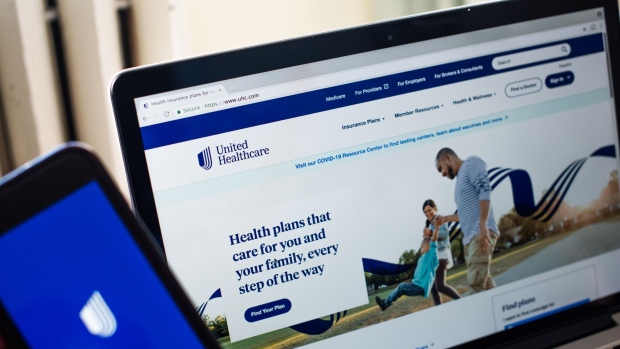Oct 14, 2021
UnitedHealth Rises to Record on Profit Beat, Bullish Outlook
, Bloomberg News

(Bloomberg) -- UnitedHealth Group Inc. expects the drag from Covid-19 to diminish in 2022 and said the surge of delta variant cases during the summer didn’t change its view of how Covid would affect its results this year.
The more bullish outlook, plus a third-quarter profit that beat Wall Street estimates, sent shares up as much as 7.4% to $433.50, an intraday record. The stock was up 5.6% at 10:45 a.m. in New York. UnitedHealth is the first big health insurer to report results and is closely watched as a bellwether for the sector.
Covid hospitalizations in the period were three times higher than in the second quarter, and double the level of the 2020 third quarter, the company said. But costs from Covid in the quarter were offset by patients deferring other care, a pattern insurers have observed throughout the pandemic, executives said.
“There has been a consistent, fairly rapid reaction when Covid cases go up nationally, in terms of the preference of patients whether or not to seek elective care,” UnitedHealth Chief Financial Officer John Rex said.
Chief Executive Officer Andrew Witty was absent from the call after having urgent treatment for a kidney stone last night. The company said the straightforward procedure went well and he’s expected back in days.
Outlook Raised
UnitedHealth said its pending deal to acquire Change Healthcare Inc., a health-care payments and technology business, is now expected to close in the “first part” of 2022. The companies had previously said the transaction would close this year.
The company said adjusted per-share earnings for 2021 would be in the range of $18.65 to $18.90. Its previous forecast was $18.30 to $18.80. UnitedHealth affirmed its long-term earnings growth outlook of 13% to 16% annually and said it would detail its outlook for 2022 at an investor conference at the end of November.
UnitedHealth also fielded a question about its risk adjustment payments from Medicare, compensation for taking care of sicker patients that’s gotten increasing attention from authorities.
“Risk adjustment levels the playing field and ensures that there’s no disincentives to care for the most vulnerable,” said Tim Noel, CEO of the company’s Medicare unit.
“We really feel that it’s an an essential part of encouraging the right incentives in the program and think that it’s something to build on,” he said. He said that private Medicare Advantage plans offer greater coverage, improved access and outcomes, with high patient satisfaction.
UnitedHealth executives also noted the effect of tighter labor markets, both in the company’s own hiring and contract negotiations with hospitals.
“The U.S. health-care market is very tight right now,” said Wyatt Decker, CEO of the company’s OptumHealth care delivery unit. “I won’t kid you, it’s tight and we’re keeping a close eye on it throughout all our operations.” He noted that the company has already brought on board 8,000 of the 10,000 physicians it intends to hire this year.
“It’s not just clinicians, it’s all workers,” added Dirk McMahon, chief operating officer of UnitedHealth Group.
Detailed Results
- UnitedHealth reported adjusted earnings of $4.52 a share, compared with $4.39 in the average of analyst estimates compiled by Bloomberg.
- UnitedHealth’s medical-loss ratio, which shows the percentage of premium revenue paid out in claims, was 83.0%
- Revenue at Optum, the company’s health-services business, increased by 13.9% compared with a year ago, and operating earnings were up by 18.5%.
- Operating earnings in the insurance division reflected new membership, reduced effects of Covid-19 and cost management, the company said.
(Updates share price in second paragraph. A previous version of this story corrected Dirk McMahon’s title in final paragraph of Outlook Raised section)
©2021 Bloomberg L.P.